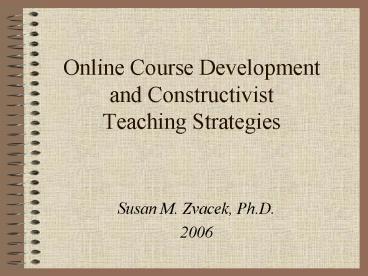Online Course Development and Constructivist Teaching Strategies - PowerPoint PPT Presentation
1 / 14
Title:
Online Course Development and Constructivist Teaching Strategies
Description:
... Taxonomy Levels (cognitive) Knowledge define, ... Consider creating and using rubrics ... Provide choices (content, assessment, sequencing, pacing, etc. ... – PowerPoint PPT presentation
Number of Views:61
Avg rating:3.0/5.0
Title: Online Course Development and Constructivist Teaching Strategies
1
Online Course Developmentand Constructivist
Teaching Strategies
- Susan M. Zvacek, Ph.D.
- 2006
2
Topics
- The 3-Step Process for Online Lesson Planning
- Integrating Constructivist Teaching Strategies
- Question/Answer Time
3
Three Steps to Lesson Planning
- What do I want my students to be able to do as a
result of this lesson/unit/course? - What sorts of activities will help them to gain
these skills? - How will I know if they have mastered the skills
I identified in Question 1?
4
Step 1. Identifying Outcomes
- Focus on what students are doing to learn
content - Guide for selecting instructional strategies and
for assessment - Shared with students
- Observable, measurable results
5
Action Words for Outcomes
- Blooms Taxonomy Levels (cognitive)
- Knowledge define, identify, match, list
- Comprehension summarize, translate
- Application apply, construct, solve
- Analysis compare, infer, diagram
- Synthesis design, generate, modify
- Evaluation appraise, defend, judge
6
Step 2. Instructional Strategies
- Gain Attention
- Inform Learners of Objectives
- Stimulate Recall of Prior Learning
- Present Content
- Guide Learning
- Opportunities to Practice New Skills
- Provide Feedback
- Assess Progress Toward Objectives
- Enhance Retention and Transfer
Robert Gagnes 9 Events of Instruction
7
Step 3. Assessing Learner Progress
- Reinforcing important concepts and skills
- Providing practice with new skills
- Identifying and correcting misconceptions
- Providing feedback on performance
- Motivating students to keep up
- Diagnosing readiness for advanced work
8
Key Assessment Concepts
- Are assessments aligned with course
goals/objectives? - Consider creating and using rubrics
- Consider offering students flexibility in how
theyll demonstrate mastery - How about including some not-for-credit
assessments?
9
Constructivism Concepts
- Focus is on students active role in his/her own
learning - Meaning is constructed in the individual (not
transmitted from outside) - Learner reflection on content
- Learner organization of content
- Emphasis on personal relevance to learner
10
Constructivist Teaching Strategies
- What are students doing to learn? (Not What am
I doing to teach?) - Require student participation and engagement
- Provide choices (content, assessment, sequencing,
pacing, etc.)
11
Constructivist Teaching Strategies
- Recognize student contributions
- Emphasize metacognition (thinking about our
thinking) - Consider motivational strategies
12
Motivation
- Attention What hooks them in?
- Relevance How is this related to a world
beyond this course? - Confidence What sorts of success experiences
will be meaningful? - Satisfaction What might generate a long-term
positive attitude toward the content?
13
Summary
- Using the Big 3 model as a starting point
- Constructivist theory as a base for student
engagement - Helping students persist by including
motivational elements
14
szvacek_at_ku.edu































